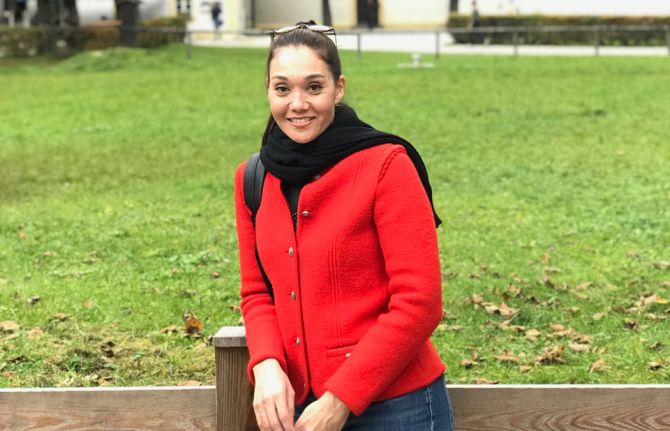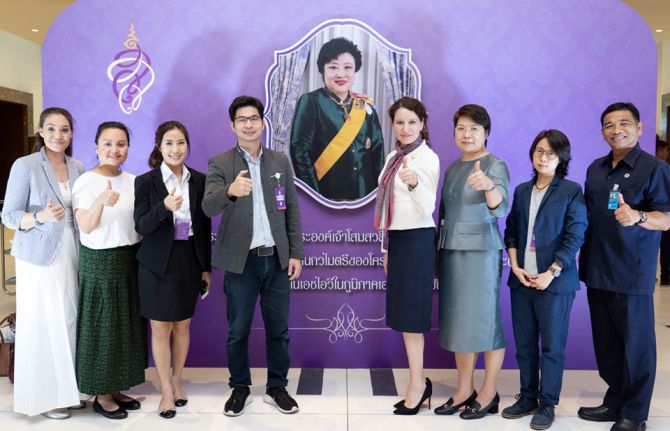



Feature Story
Supporting communities to be involved in the AIDS response in Thailand
20 January 2020
20 January 2020 20 January 2020The UNAIDS Country Office in Thailand, with a small team of three staff members, is located in Bangkok. Orawan Bettenhausen, the Administrative Assistant, has been part of the team for almost 20 years. “Being part of the UNAIDS family has empowered and transformed me into who I am today. I have been very fortunate to have had country directors who have coached me, and great colleagues and peers, both within and outside of UNAIDS, who have assisted, supported and inspired me,” she said.
Ms Bettenhausen recalls meeting a person living with HIV, a representative of the Thai Network of People Living with HIV, in her first weeks with UNAIDS. “I asked him about his life. When he finished talking, I was in tears,” she said. “To my surprise, he told me that neither he nor any other person living with HIV would want me to feel sorry for them. They just wanted to be accepted for who they are. He taught me a huge lesson, and I made a commitment to work for people living with and affected by HIV.”
Throughout the years, she has assisted the Country Director and the team to get communities, civil society organizations and people living with HIV meaningfully involved and engaged in the AIDS response. “As the Administrative Assistant , I do feel that I support our community partners in different ways, such as contributing to the execution of joint projects, facilitating logistic support to make sure communities can attend regional and national events and providing interpretation from Thai to English and vice versa. I feel I am giving community members the opportunity to overcome language barriers, to be present in decision-making spaces to voice their needs and showcase their work outside Thailand,” she explained.
Ms Bettenhausen has witnessed important changes in the AIDS response in Thailand. For example, she remembers UNAIDS implementing projects in collaboration with civil society organizations and facilitating dialogues between policymakers, HIV programme implementers and community representatives at a time when stigma and discrimination against people living with HIV and key populations was a major concern in the country.
Since 2015, Thailand has implemented the 3-by-4 Package for Stigma-Free Health Facilities, with comprehensive programmes to address and remove barriers to accessing health services. In 2019, the country announced the Thailand Partnership for Zero Discrimination, which goes beyond health settings and includes areas such as workplaces and the education system. UNAIDS has been involved since the outset of the initiative by providing technical assistance to formulate the zero discrimination strategy, to develop a monitoring and evaluation plan and to operationalize the strategy in a joint effort with the Thai Government and civil society.
“My contribution to this achievement was to provide continuous support to the Country Director, who played a critical role in linking stakeholders from different sectors and bringing them together, making sure that communities were always involved and enabled to speak up. Now our government counterparts work alongside civil society organizations. All key stakeholders are equal and come together to make decisions and move in the same direction. A true partnership!” said Ms Bettenhausen.
Ms Bettenhausen grew up in northern Thailand. Her passion for the public sector started in early childhood, as she watched her father improve the livelihoods of farmers and their families through his work as an adviser for the German Government and rural development donors. Later, while studying for a master’s degree in management, she realized business was not her calling and made the decision to write her dissertation on the Human Development Center, a nongovernmental organization working in the Klong Toey slum in Bangkok. The two months that she spent working in the slums and collecting data for her dissertation gave her insight into urban poverty, drug use, child abuse and HIV. “After I graduated, I joined the business world for two years, but I felt my vocation was to follow in my father’s footsteps and to work for people. Fate was on my side and I got a position with UNAIDS,” she said.
Ms Bettenhausen’s main challenge at the Country Office is to keep up with the various tasks, as administrative work is often time-consuming. Nevertheless, she believes that everything done with due diligence is contributing to making a difference. Her work is not only critical to ensuring that the UNAIDS Country Office can fulfil its mandate, but also key to achieving the goal of ending AIDS by 2030.



